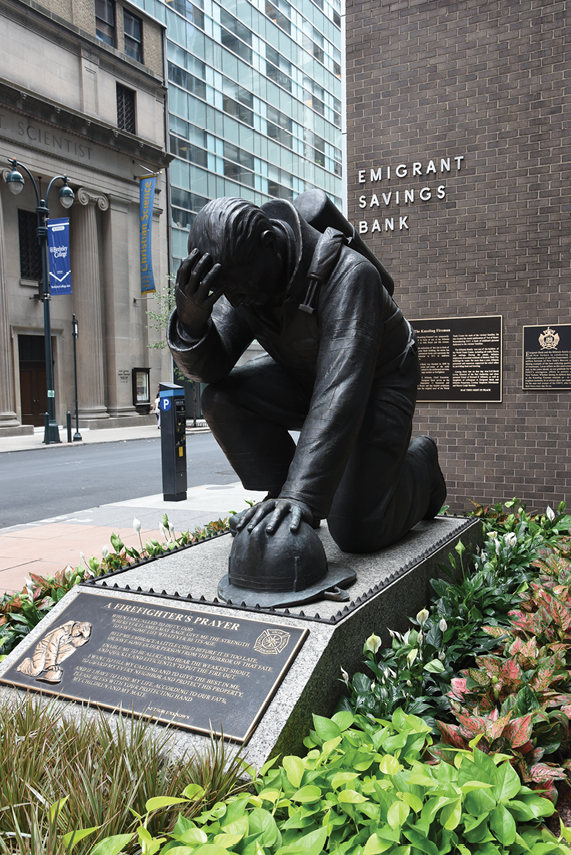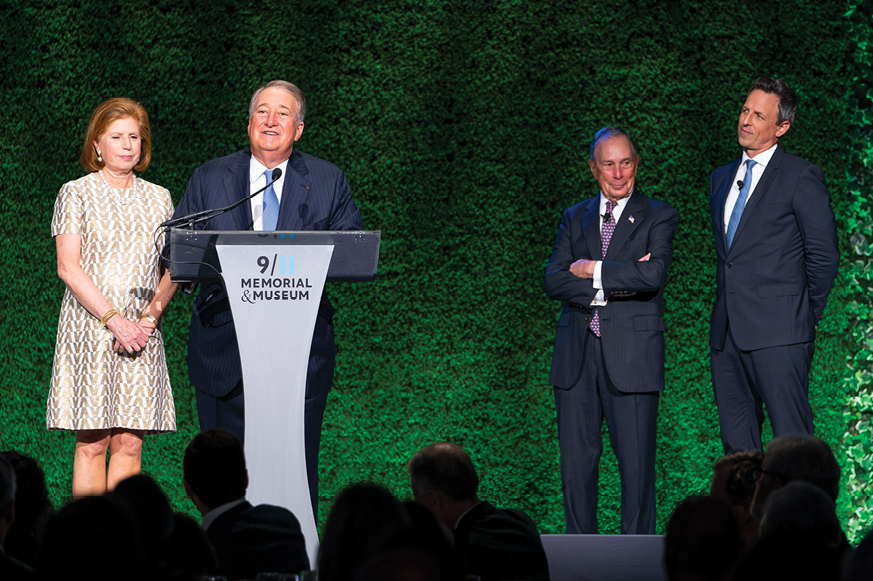- Home
- Media Kit
- Current Issue
- Past Issues
- Ad Specs-Submission
- Ad Print Settings
- Reprints (PDF)
- Photo Specifications (PDF)
- Contact Us

![]()
ONLINE

Revitalizing
New York and
the Nation
EDITORS’ NOTE
Howard Milstein is the third generation to lead the Milstein family business and philanthropic activities. An entrepreneurial builder of innovative, large-scale companies, Milstein’s ability to marshal business, government, philanthropic, and family resources drives a breadth of initiatives. Milstein is Chairman and CEO of New York Private Bank & Trust and its operating bank, Emigrant, and chairs and operates the Milstein family’s real estate companies. He is also owner of 8AM Golf, a holding company for golf brands such as the Nicklaus Companies, GOLF Magazine and the GOLF.com website, among others. In the philanthropic arena, Milstein is a Trustee at Cornell University, an Overseer of Weill Cornell Medical College and serves on the Dean’s Advisory Board of Harvard Law School. He is Chairman of the Milstein Medical Asian American Partnership Foundation, and also serves on the boards of the National September 11th Memorial, National Committee for U.S.-China Relations, the Nicklaus Children’s Healthcare Foundation and PGA REACH. Milstein was named the 2008 Entrepreneur of the Year by Cornell University, and also served from 2011-2014 as Chairman of the New York State Thruway Authority, where he successfully led the design and procurement process for a new Tappan Zee Bridge, the largest infrastructure project in the nation.
company BRIEF
New York Private Bank & Trust (nypbt.com) and its operating bank, Emigrant, offer fully integrated banking, investment advisory, trust, lending, co-investment, and other financial services to meet the needs of individuals, entrepreneurial businesses, and high-net-worth families. Founded in 1850 by members of the Irish Emigrant Society to support the financial needs of a growing immigrant community, Emigrant is the largest family-owned and operated bank in the United States. Emigrant continues to serve both its traditional customer base as well as new generations seeking a better way of life for themselves and their families.

Emigrant Bank’s Midtown headquarters,
with its distinctive “Kneeling Firefighter” memorial, which
honors first responders and their sacrifice in times of crisis.
Emigrant Bank employees worked tirelessly in the wake
of the pandemic to provide mortgage forbearances
and PPP funds to small businesses.
As the leader of a purpose-driven organization with a long history of supporting its communities, how have you adapted and provided support during this unprecedented time?
We are very proud of our long history of giving back to the communities in which we operate. Good corporate citizenship is woven into the fabric of all our businesses. In this most recent crisis, for example, we were able to purchase a supply of more than one million N95 masks which were donated to Weill Cornell, Columbia Presbyterian and New York City first responders. We were inspired by the tireless dedication of our city’s doctors and nurses, police, firefighters and EMTs, and watched with great admiration as they put their lives on the line each and every day. Providing these much needed medical supplies was one small way we could step up and meet a need. In a similar manner, in the wake of Superstorm Sandy, which hit the New York area in 2012, we donated $2.3 million to first responders at New York City’s Fire and Police Departments who worked tirelessly to rescue other New Yorkers even as their own homes were being severely damaged or destroyed. Additionally, in 2005, Emigrant Bank made a donation to its customers in areas impacted by Hurricane Katrina. Approximately $1 million in funds were deposited directly into customers’ Emigrant accounts and were available for immediate withdrawal.
We have also been very active on the medical front over the years, including supporting research to fight infectious disease – research which may have applications in the fight against COVID-19 and other coronaviruses. We founded the Abby and Howard P. Milstein Program in Chemical Biology and Translational Medicine at Weill Cornell Medicine, for example, and funded the launch and operation of the institution’s first Chemical Biology Core Facility. Seed grants in multiple laboratories sustained an innovative line of discovery championed by its director, Dr. Carl Nathan. With Milstein Program support, the Nathan lab discovered the first drug-like molecules that kill Mycobacterium tuberculosis (Mtb), the bacterium that causes tuberculosis, the world’s single leading cause of death from infectious disease. The molecules discovered by Dr. Nathan kill Mtb by inhibiting an Mtb enzyme complex called the proteasome. The practical impacts of discoveries such as these have been felt worldwide.
You have a deep commitment to New York City, which has been heavily impacted by the pandemic. What are the keys to New York’s recovery and how critical is it for there to be a strong public/private partnership to ensure a safe and effective reopening?
History has shown that an effective partnership between the public and private sectors is the key to long-term renewal, and this is true not just in New York, but nationally as well. As we’ve seen in this pandemic, government can’t do it alone. Private resources, leveraged in close partnership with the work of public entities, can make a tremendous difference. Businesses have a responsibility not just to shareholders, but to the community around them, while government must be prepared to foster entrepreneurship and opportunity in ways that bring the American dream to a new generation. Like any relationship, effective public/private partnerships are built on a foundation of trust and shared responsibility. If either business or government looks to attack and tear down, we will never build up. Cooperation for the mutual good and societal benefit is key.

Howard Milstein has a long history of service to New York City.
In 2019, he and his wife Abby were honored by the
9/11 Memorial & Museum for “Distinction in Civic
Innovation and Renewal.”
How have your employees changed the way they work in order to be effective with the changes that have been necessary for all businesses to make and how proud are you to see the resilience of your team?
My companies began transitioning to work-from-home in early March. It was an enormous undertaking, because very shortly thereafter, the banking sector became crucial to sustaining our economy through the Paycheck Protection Program in the CARES Act. I’m proud to say that, at a time when many big banks hadn’t even gotten their programs underway, our Emigrant Cares team worked nights and weekends – practically 24/7, in fact - to ensure that these loans were made available to small business nationwide. I am proud to say our team was able to close PPP loans totaling more than $200 million, which preserved approximately 17,000 jobs. At the same time, our mortgage lending operations were also dealing with forbearances at a level rarely seen in our bank’s history. We worked closely with regulators in each of the jurisdictions in which we operate to ensure we were providing critical relief to homeowners in need. In the first months of the pandemic, Emigrant approved nearly half a billion dollars in forbearances for our mortgage customers. In both of these cases, we had to create new teams and departments and move quickly to get real relief to those in need. It was a remarkable effort, and a testament to the Emigrant team and their selfless dedication to the communities they serve.
During this difficult and uncertain time, what are you telling your people and what would you say to young people across the country who are deeply concerned and uncertain about the future?
The American ideal is a unifying force, and we as a nation have a long history of banding together for the greater good, particularly in the wake of crisis or hardship. That is why I have advocated for a National Service Program for all young Americans. I believe that through national service, we can bring young adults together while also contributing to the prosperity of our country and making our nation healthier, safer and more secure. Under such a program, young Americans healthy enough to participate would serve for at least a year in areas such as military service, the Peace Corps, Teacher Corps or other initiatives involving health and wellness, infrastructure, or local and regional security. During service, participants would be paid and also have the opportunity to earn tuition credit for college. In this fractious age, where challenges to both our national security and national identity threaten to drive us apart, affirmative steps can be taken to unify, rather than divide, and ultimately to give back to our nation to which we owe so much. The main point of this effort is to restore the idea of citizenship and that we are all on the same team.
There is a great deal of discussion about businesses reopening in a “new normal.” What is your outlook for what this new normal may look like in New York?
The great question before us is: “Will cities, including New York, survive?” I think the answer is unquestionably yes. New York City will change, our nation will change, but the urban center will remain vital to the life of our society. Cities have been historically the center of creativity, culture, entrepreneurship and opportunity. Technology may facilitate the flow of information, but nothing replaces the face-to-face interaction and the social benefits of being together. Safety has always been the issue in any city, and going forward the focus will be on health as well as crime and terrorism. This is as it should be. The goal is, as it has always been, to create an urban environment that is a great place to live, to work, and to raise a family. I have no doubt in our “new normal” we will once again reach this goal.
The pandemic is being fought on the front lines by healthcare workers, first responders, those providing supplies and meals, transportation workers and all other essential workers. What do you say to these true leaders and heroes that are risking their lives to protect others?
All New Yorkers should first offer thanks to our nurses, doctors, police, firefighters and EMTs, all of who were on the front lines of this war as the enemy virus raged in its early stages. We should also thank teachers and other essential workers who will be at the forefront of rebuilding our institutions and infrastructure. More than this, though, I believe we have a responsibility to this new generation of heroes. A responsibility to come together, as a city and a nation, to rebuild, renew and revitalize. Business, government, nonprofits – all of us – need to continue to make the kinds of sacrifices, in big ways and small, that ensure the ideals upon which our nation was founded, to secure a more perfect union, and to help all of us achieve the American dream.![]()